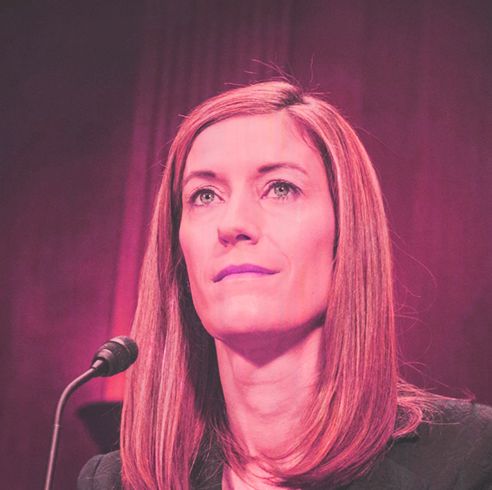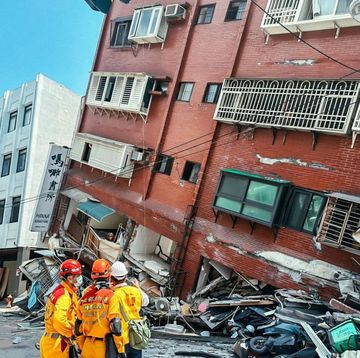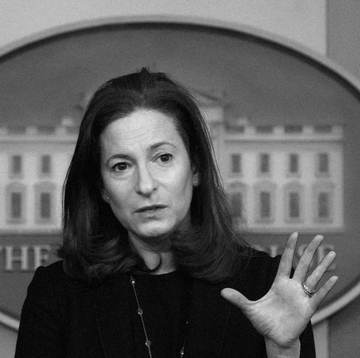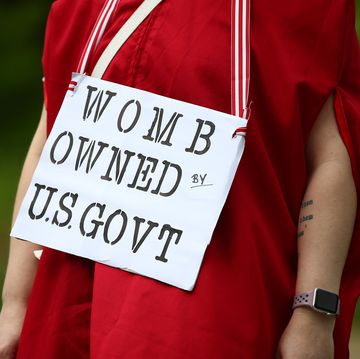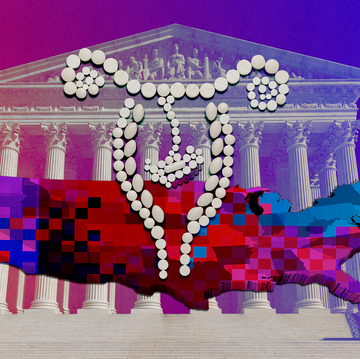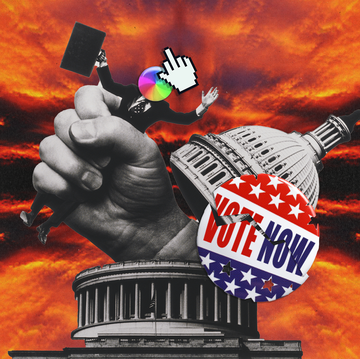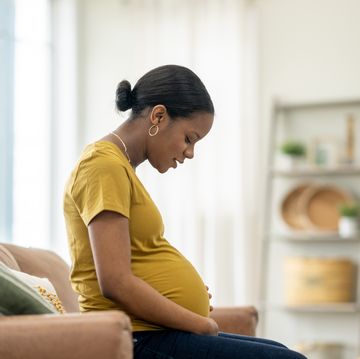In Kansas City, Kansas, an employee of the housing authority exposed himself to the women whose housing he oversaw. In Grand Rapids, Michigan, the owner of a slew of rental properties groped female tenants and applicants. And in Morgantown, West Virginia, a landlord came into his tenants' homes without warning so he could sexually harass them.
Under the Fair Housing Act, sexual harassment and abuse in housing is illegal. But many women don’t know that’s the case — and so never report it. That’s where a new Department of Justice initiative comes in. Earlier this month, the department’s civil rights division launched a program to encourage more women to report harassment and abuse from landlords, property managers, and other rental property staff, and created a new reporting pipeline that brings local law enforcement together with Justice Department officials.
So far, the pilot program is just in Washington, D.C., and western Virginia, but the department plans to bring the program to more states soon.
Associate Attorney General Rachel Brand, the No. 3 at the DOJ, talked to Cosmopolitan.com about the new effort as well as other issues related to her department.
Why is this necessary and how did it come about?
Many women — and men frankly — don't realize that sexual harassment in housing is illegal under federal law. I think most women probably know that if they're being sexually harassed by their employer or by their boss, that's actionable. They can bring a lawsuit. But they may not know that about housing. And our civil rights division realized that this was a problem that's underappreciated in the public, and so we want to make sure that women know their rights and that they have somewhere to go if it's happening to them.
Break down this reporting pipeline for me. How does it actually work?
The Department of Justice civil rights division's website has a place that women can go to report instances of sexual harassment in housing. Women have two options. They can bring a lawsuit themselves, and/or they can report the allegation to the Department of Justice. And in cases where the landlord or the real estate agent or whoever the offender is has victimized multiple victims, then the Department of Justice can bring it to an investigation and lawsuit potentially.
The pilot program says that law enforcement will work with the Justice Department to handle these allegations. How will they work together to make sure that these crimes are prosecuted?
They would do that just like they would do any investigation. Which is, they would start taking a look at the evidence and, depending on the case, interview witnesses, talk with local law enforcement if local law enforcement is involved. But I think the point here is that women can come directly to the U.S. Department of Justice. They don't need to go to the local police department, right? And you know one of the problems here is that sometimes if a landlord is asking for sexual favors in exchange for reduction of rent or if a woman can't pay and the landlord tried to sexually harass her as a result, she might go to the police and the police might say, “Well, that's not a crime.” And if that happens, she still has somewhere else to go, which is here, to the U.S. Department of Justice, to file a complaint.
So police might say that mistakenly? They might just not know?
Well, it might not be a crime under local law, right? That's the point. Some of these cases are unbelievably horrific and involve rape and sexual assault and things that are certainly crimes under local law. Sometimes they might be illegal under federal law and egregious, but it might not be a crime under the locality's local law. So there's still a place to go, which is the Department of Justice. Because under the Fair Housing Act, which is a federal law, sexual harassment in housing is illegal.
The Justice Department has said that women often don't know and police officers, too, often don't know that this kind of harassment is against the law so they don't report it. How do you plan to make women aware of this new initiative?
Well, that's part of the reason for the initiative, and thank you for asking for the interview because interviews like this and other public affairs, public relations efforts, will get the word out to women that they have somewhere to go. So we'll be using every opportunity we get to get the word out.
Other than interviews with media outlets, how will the DOJ be trying to make sure women know that they can report these things?
There are all kinds of way to engage people, like education. The civil rights division is constantly engaged in community outreach — you know, there are women's organizations that we can talk to. We'll be doing more press, it's on the website, this will be an ongoing process which we'll undertake in connection with our public affairs office. And when there's a successful case, for example, we do a press release and try to put that out there and hopefully the press will pick up on it, somebody will see it and realize, “Oh wow, there's actually some cause of action there. There's a place to go if that's happening to me."
With sexual harassment in housing, there's obviously this power imbalance where a woman is abused or harassed by her landlord, who has so much control over her life. And we've seen this with the flood of allegations against Harvey Weinstein and women who are coming out and talking about this. How does this initiative shield women from retribution?
The Fair Housing Act also contains a retaliation provision. So if a landlord retaliates against a woman for making an allegation of the act, that is itself illegal. Which is very common in civil rights statutes. That's the case too in Title VII if you're discriminated against in employment, for example, on the basis of race or sex and you make an allegation then and the employer retaliates against you. That itself is illegal and could be the subject of a lawsuit. It's the same here.
Police officers often don't believe women who are victims of sexual assault or harassment. How will you ensure that if women take the proper steps and they go through these channels that they will receive justice?
I think that many police officers are very sensitive to allegations of sexual assault and sexual harassment. The whole point of this initiative is to create a place for women to go specifically to report these kinds of allegations. So people can be sure that if they bring an allegation to the Department of Justice under the Fair Housing Act, we'll take it seriously.
In guidance that Attorney General Sessions sent to the Justice Department earlier this month, he said that the Civil Rights Act does not protect transgender people from workplace discrimination. Given all the Justice Department oversees, why is something that gives less protection to people a priority?
We are committed to enforcing all of the laws that Congress has given us to combat discrimination of all kinds. And many federal statutes, like the Violence Against Women Act, the Matthew Shepard Act, specifically protects people on the basis of their gender identity, and we absolutely enforce those laws. You may have just seen the New York Times article about the attorney general sending a federal prosecutor out to help local prosecutors in Iowa with a hate crime against a transgendered young woman. And, you know, certain statutes have those provisions, other statutes don't. And so we take the statutes as Congress gives them to us, and Congress is always free to expand those statutes and provide greater protection if they wish.
So you're saying there are already laws in place that protect transgender people or gender identity from workplace discrimination?
There are many statutes that do specifically specific protect people on the basis of their gender identity. Title VII is not one of them, but again, we're a law enforcement agency and we can only enforce the law as Congress gives it to us. We have no power to expand the law beyond what Congress provides. But Congress certainly has that power and is welcome to do so.
You mentioned the attorney general sending a hate crimes lawyer to Iowa to prosecute the murder of a transgender high school student. In June, the attorney general said that “no person should have to fear being violently attacked because of who they are, what they believe, or how they worship.” Why doesn't that freedom from fear extend to the freedoms from being discriminated against?
We believe that hate crimes on the basis of gender identity are, well, first of all, they're illegal, and they're just as important as hate crimes on the basis of religion or race. The attorney general spoke at the Hate Crime Summit that we at the DOJ civil rights division convened recently. And he spoke specifically about crimes against transgendered individuals and talked about the numerous investigations we have underway into crimes against transgendered individuals to see if they are hate crimes under federal law. So that is absolutely something that we are doing every day. And the AG is personally committed to taking that work on.
I understand the commitment to protecting transgender people, and all people from hate crimes, but why not also the freedom from fear of being discriminated against?
Well, Congress passes the laws. And Congress has chosen to include gender orientation in some laws, not in others and that's — for better or worse, when we're a law enforcement agency, we don't get to decide what's right. We get to take the laws Congress give to us, and if Congress amends Title VII to include discrimination on the basis of gender identity, we will enforce that law.
The attorney general said yesterday that he reserves the right to jail journalists if “we have to.” Taking that with President Trump's stance toward the press — such as tweeting that network licenses should be revoked if they broadcast coverage he doesn't like — how concerned should journalists be about facing legal consequences for doing their jobs?
I didn't see the AG comments that you're referring to, but I doubt he said exactly what you just characterized. There is a media shield policy that the Department of Justice has, which governs how and when the department can seek information from journalists in criminal investigations, in particular national security investigations. And I understand that a review of that is underway at DOJ. That is not part of my bailiwick, so I'm not personally involved in that. I'm sure there's somebody else you could ask, but that's all I could tell you on that.
He had said to Senator Klobuchar, she had asked, “Will you commit to not putting reporters in jail for doing their jobs?” and he said, "While I don't know that I can make” — I'm quoting here — “while I don't know that I can make a blanket commitment to that effect, but I would say this: we have not taken any aggressive action against the media at this point. But we have matters that involve the most serious national security issues that put our country at risk and we will utilize the authorities that we have legally and constitutionally if we have to."
I’m going to have to refer you to our public affairs office for somebody who actually works on those issues. I'd be happy to answer your questions about the sexual harassment initiative if you have any more. Otherwise, I'm going to have to get to a meeting.
I do have another question on the initiative. We talked about this with regard to police, but society tends to not believe women who come forward with these allegations. And we saw this play out before the election when women came forward making accusations against then-candidate Trump. In this culture of not believing women who make these allegations, why should women feel comfortable coming forward through this initiative?
I think that women absolutely should have a place to go to make allegations of sexual assault or sexual harassment. The U.S. Department of Justice civil rights division has a long history of vindicating the rights of women who have been discriminated against. And you have my commitment that women who bring allegations here will get the process that they're entitled to.
Is there anything else that you think Cosmo readers should know about this initiative?
We really just want women to know that they have rights in this area. We don't want people to think that they're alone. We don't want people to think that they have to choose between a place to sleep and being sexually harassed. And so hopefully your article — and thank you for doing it — will help to get the word out.
Follow Rebecca on Twitter.

Rebecca Nelson is a magazine writer in New York. Her work has appeared in the Washington Post magazine, GQ, and many other publications.
